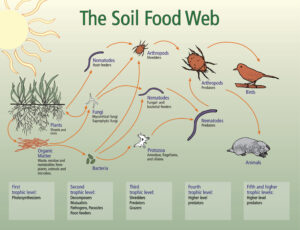What is the soil food web?
Related Articles
Dr Deidre Charleston from Origin Amenity Solutions (OAS) reveals the mystery of the soil food web.
The soil beneath our feet is home to a complex, dynamic ecosystem known as the soil food web. This intricate network of organisms, ranging from microscopic bacteria to larger organisms like insects and earthworms, plays a pivotal role in sustaining the health and productivity of terrestrial environments. Understanding the functions of the soil food web is crucial to maintaining ecological balance, growing healthy turf and improving sustainability.
Nutrient cycling
At the heart of the soil food web lies the process of nutrient cycling. Nitrogen is essential to life as it is the key component of amino acids, proteins and nucleic acids (DNA and RNA). Seventy-eight percent of the earth’s atmosphere is composed of nitrogen, but it is in a form that most organisms cannot use. Bacteria are at the heart of the nitrogen cycle, fixing and converting the nitrogen into forms that can be used by other organisms. A healthy functioning soil food web is critical to the cycling of nutrients. Decomposers such as fungi, bacteria and detritivores break down organic matter into simpler compounds, releasing essential nutrients like nitrogen, phosphorus and potassium into the soil. Predators such as protozoa and nematodes feed off bacteria and other microorganisms in the soil food web, releasing excess nitrogen into the soil. These nutrients are then in a form that is available to turf, facilitating growth and development. Mycorrhizal fungi form mutually beneficial symbiotic relationships with plant roots, enhancing water and nutrient uptake, and improving turf resilience to environmental stresses.
Soil structure and stability
Soil organisms are crucial in maintaining soil structure and stability, improving water infiltration and drainage. Bacteria and fungi secrete glues and polysaccharides that bind soil particles together to form aggregates and build soil structure. Mycorrhizal fungi secrete glomalin, a powerful binding agent that also stores a significant amount of carbon. The organisms in the soil food web play a vital role in carbon sequestration through the decomposition of organic matter and the formation of stable organic carbon. Estimates suggest that soil stores more carbon than the earth’s atmosphere and vegetation combined. Therefore, promoting healthy soil and microbial diversity can provide a natural solution to the impact of climate change.
Plant tolerance
Predatory organisms within the soil food web regulate pest species and help to maintain ecological balance. Soil microbes also help to suppress pathogens through mechanisms such as competition for resources, antibiosis, and by promoting induced systemic resistance in turf. In addition to this, by improving soil structure and recycling nutrients, the soil food web contributes directly to turf health and creates an environment where turf is better able to tolerate stress.
Like any ecosystem, the soil food web is susceptible to disruption which can impair its ability to function correctly. Intensive management practices can lead to a change in biodiversity. As organisms disappear from the environment it becomes less resilient, and turf becomes more susceptible to stress. Intensive inputs, compaction and poor infiltration and drainage have the potential to adversely impact the habitat of non-target organisms, disturbing population dynamics and trophic interactions. However, by adopting a holistic management approach that considers not only chemistry and physics but also biology; soil structure and function can be improved. Consider introducing products like Symbio Compost tea or Symbio Biotabs to your management practices to enhance the diversity of the soil food web. A healthy and diverse soil food web is the cornerstone of essential functions such as nutrient cycling, improved soil structure, plant tolerance and climate regulation. Recognising the relationship between soil organisms and ecosystem processes highlights the importance of preserving soil biodiversity. By protecting the health of the soil food web, we can ensure the resilience of the environment and improve turf performance.
For further information or product advice speak to an OAS representative on 0800 138 7222 or visit www.originamenity.com




























